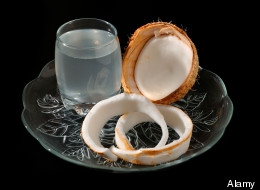I can’t turn my head lately without seeing an advertisement for coconut water. As if over night coconut water has become the hydrator of choice, being dubbed “Nature’s Sports Drink.”
The idea of it sounds great: A liquid right out of nature that can replace our corn syrup, food coloring filled synthetic sports drinks. With today’s health craze, it’s no wonder people are flocking to the stuff in droves. But as much as I’m all for Natural VS. Processed, my curiosity wheels started turning.
How does coconut water really stand up against sports drinks, and is it really as great for you as it’s being portrayed?
Here’s what I found:
Coconut Water Facts
Firstly, I should mention that coconut water and coconut milk are not the same. Coconut water is the liquid found in young, green coconuts whereas coconut milk is a high fat liquid that comes from the meat of a ripe coconut.
The locals of the tropical countries where coconut water comes from have been consuming coconut water straight from the nut long before it became a North American trend. It has long been known for it’s medical properties and health benefits.
Coconut water has a chemical composition similar to human blood plasma and is naturally sterile. It was used straight from the nut to give emergency transfusions to soldiers in World War II’s Pacific War of 1941-45 when blood wasn’t available. The American Journal of Emergency Medicine reported that it has been given intravenously to patients in place of medical saline for short-term hydration. [Source: Hans.org]
Known to be a mild diuretic coconut water can help prevent urinary tract infections, lower blood pressure, and is high in lauric acid, which helps fight herpes and flu. It has been recommended to help pregnant women and the elderly stay hydrated, and has also been used to prevent dehydration from diarrhea and a few hangovers :p
It is low in fat, cholesterol-free, and full of vitamins and minerals such as calcium, magnesium, and most importantly potassium.
The typical American diet is low in potassium (due to not eating enough fresh produce) and high in sodium (due to large consumption of processed foods). Studies have found that people with diets low in potassium and high in sodium are twice as likely to die from heart related illness.
According to the United States Department of Agriculture Nutrient Database, the water from one coconut contains about 22% more potassium than a medium-sized banana. Therefore, it’s a great source for the stuff!
Up Against the Big Guys, Sports Drinks
Coconut water’s claim to fame as a natural sports drink comes from it’s electrolytes, and vitamin, mineral content. It stomps the competition in terms of nutritional value with high levels of fiber, riboflavin, choline, calcium, copper, iron, magnesium, phosphorus, potassium, selenium and zinc. It is of course also free of dyes, chemicals, and sugar.
But where it falls short is its sodium and carbohydrate content. Researchers don’t think that coconut water contains enough sodium or carbs for the body to recover properly during prolonged and/or strenuous exercise. Sodium is lost when sweating, and even a slight drop in blood sodium could potentially cause health problems. Sodium is needed for transmitting nerve impulses and for proper muscle function, and carbs are needed to replace loss of muscle energy (glycogen).
Coconut water has only 400 mg/liter of sodium compared to 600 for sports drinks. Therefore, it is recommended that professional athletes, those who do heavy workouts, or workout more than an hour stick to sports drinks.
But if you are adamant about having a healthier alternative to sports drinks, there are ways around coconut water’s lack. For instance, world record holder for having played the longest tennis match in history, John Isner, credits his endurance on the court to coconut water mixed with sea salt. He also mixes it with protein powder post-match. To get proper carbohydrate consumption, you can partner your coconut water with a snack like a couple of pretzel sticks, a sports bar, a banana, raisins or some yogurt. Being creative like this can help you to stick with coconut water, which is by far the healthier option.
If you are a light or moderate exerciser however there is no reason to waste your money on coconut water OR sports drinks, as water is always the best hydrator.
WARNING: Read the Label!
What you don’t know about coconut water is that the reason why it’s traditionally drunk directly from the nut is that once exposed to air, coconut water begins to ferment and rapidly loses most of its nutritional traits. To eliminate the risk of bacterial growth, commercial bottlers are forced to sterilize it using the same pasteurization process as milk, which destroys some of coconut water’s nutrients.
Furthermore, now that coconut water has become famous all of a sudden, major corporations such as soft drink companies have got a hold of the market. This means you should read the label and always make sure you know what you’re drinking. Many coconut waters are full of added sugar, and some are only 10% coconut water and mixed with other juices, sweeteners and chemicals.
If your looking for the pure real stuff the best source is the source! Partially husked young coconuts can be found at Asian food markets or health food stores. When selecting a coconut, look for one that’s heavy and full of water. (when shaken, you don’t hear a swishing sound because it’s full) The husk should be white with no purple or brown spots.
Another choice is freshly pressed unpasteurized coconut water that is flash-frozen and shipped in BPA-free plastic bottles. Several companies are starting to offer this on the Internet, but it is hard to find, and you will need to consume it within three days of defrosting to avoid fermenting.
The Bottom Line
By itself, coconut water is not ideal for prolonged or intense exercise, but is still a healthy, vitamin filled, low calorie alternative to juices and soft drinks. (as long as its 100% coconut water)
If you are working out for 30 minutes or are bored with plain ol’ water, coconut water certainly is a great alternative at only 45-60 calories per serving. Save the sports drinks for those who workout enough. If you’re not burning it off the sodium, added sugar and calories can really add up!
Recipe: Coconut-Lemon Thirst Quencher
Here is a great recipe, created by Jennifer Trecartin, BSc, RHN. It is ideal to replace electrolytes after a workout, is rich in vitamins and minerals, low in sugar and easy to drink. Additionally, it works great as a thirst quencher on hot summer days and is perfect to replenish fluids in the dryness of the winter and, of course, on those mornings following that big night out.
- 1 lemon
- 1 1/2 cups coconut water
- 1/2 cup water (or more depending on desired concentration)
- 1 tbsp honey or agave
- 1/2 tsp grated ginger root
- Sea salt to taste
- Squeeze the juice of the lemon into a blender. Add coconut water, water, honey, ginger and sea salt into blender. Blend.
- Alternative serving suggestions
Popsicle: Freeze in popsicle molds and make delicious, healthful popsicles for the whole family to enjoy!
Slushy: Replace a 1/2 cup of water with ice and make a nice cold refreshing slushy.
Sources: Cbc.ca, Hans.org, The Globe and Mail, Sciencedaily.com






 Payments powered by:
Payments powered by:

